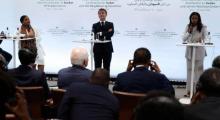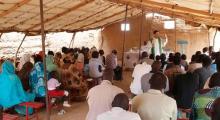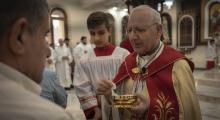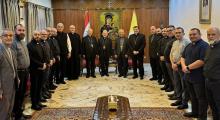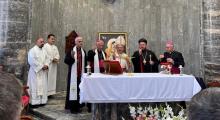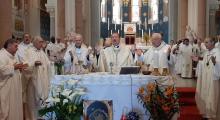Issued by the Catholic Center for Studies and Media - Jordan. Editor-in-chief Fr. Rif'at Bader - موقع أبونا abouna.org
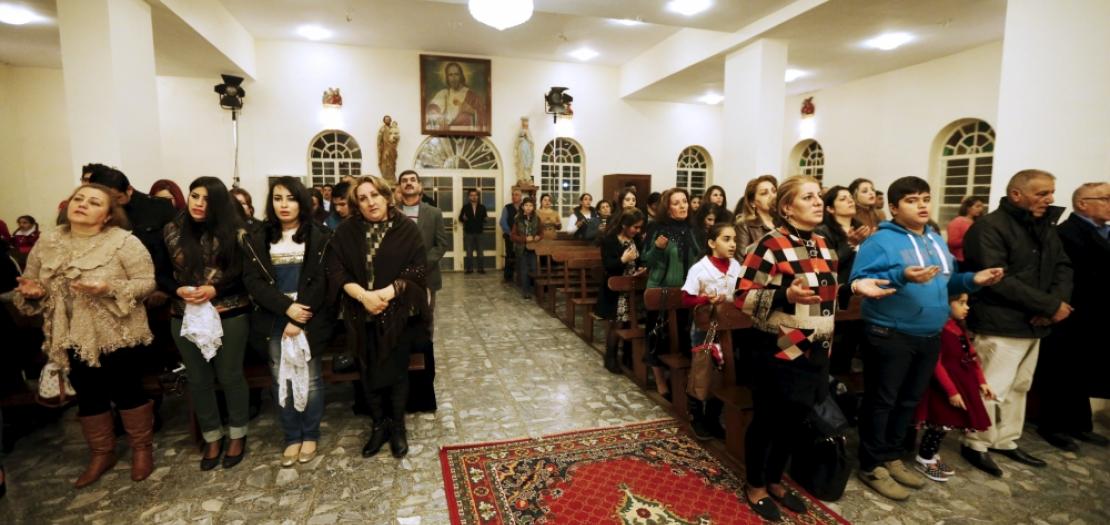
It was the night of August 6, 2014. Fresh from their capture of Mosul, ISIS fighters swept through the Nineveh Plains and overnight drove more than 12,000 Christian families from their homes and ancestral lands. The families fled, quite literally, with only the clothes on their backs.
In Kurdistan, they joined the approximately 15,000 Christians who had fled Mosul just weeks earlier. For the next three years, some 120,000 internally displaced persons (IDPs) were housed, fed, and clothed by the Chaldean Archdiocese of Erbil. Led by Archbishop Bashar Warda, whose herculean efforts were made possible by the steadfast support of an array of faith-based agencies, the local Church was even able to open six new schools so the children would not be deprived of their education.
Now, with the third anniversary of that dark night in view, there is a glimmer of hope. The Iraqi government has just recaptured Mosul, while earlier this year ISIS was expelled from the Nineveh Plains. Iraq’s long-suffering Christians, worn out by many months of living in make-shift conditions, now want to go home.
Patriarch Louis Raphael Sako of the Chaldean Catholic Church has urged the Christian IDPs to “return quickly to reclaim their lands before others seize them” and to avoid internal disputes. “We are the indigenous people of this country and its ancient civilizations, he added. “Our history is traced back to the oldest Christian Church in the world.”
As of this writing, more than 1,200 families have returned to their newly repaired homes on the Nineveh Plains. However, 13,000 Christian-owned homes await repair or rebuilding. And the revamping of the basic infrastructure of the nine Christian towns and villages on the Plains requires major funding — well beyond the ability of faith-based groups to deliver. Meanwhile, the overall situation is far from stable and secure. The threat of renewed violence hangs over the land.
Baghdad may tout its defeat of ISIS, but the group’s Sunni co-religionists still feel like second-class citizens in Iraq, as their devastated cities get scant help from the government. That situation is made worse by the growing influence of Shiite Iran, thousands of whose fighters have joined Iraq’s security forces. There are also reports that ISIS militants are going underground, preparing for guerrilla warfare, suicide attacks, and car bombs.
Christians are at risk — yet again — of becoming collateral damage of the Sunni–Shiite battle for control of Iraq and the larger region.
The issues affecting the region are complex and constantly evolving. On September 25, 2017, the autonomous Kurdistan Regional Government will hold a referendum on declaring independence from Baghdad. KRG president Masud Barzani has promised that an independent Kurdistan would respect the rights of Christians living on the Nineveh Plains. However, a declaration of independence from Iraq proper may lead to a war pitting Baghdad against Kurdistan precisely on the Nineveh Plains — and Christians would again be put in harm’s way.
Christians and other religious minorities count on the Western governments — and the U.S. in particular —not only to help fund the reconstruction of the Nineveh Plains but also to use their power and influence to get both Baghdad and Kurdistan to guarantee the security of all minorities and to ensure their equality of citizenship, including their property rights and freedom of worship.
The West must act now. For if a significant number of Christians do not return to the Nineveh Plains very soon, and the power vacuum persists into 2018, the hopes for an enduring renaissance of Christianity in Iraq may be dashed forever.


